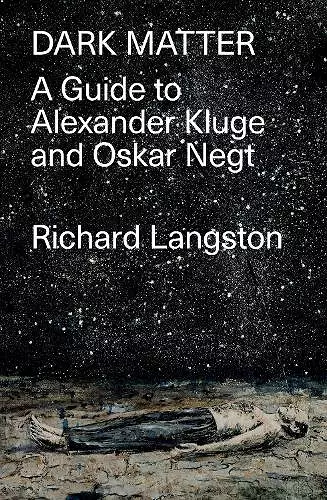Dark Matter
A Guide to Alexander Kluge & Oskar Negt
Format:Paperback
Publisher:Verso Books
Published:4th Aug '20
Should be back in stock very soon

Unravelling the thought of Frankfurt School theorists Alexander Kluge and Oskar Negt.
Unravelling the thought of Alexander Kluge and Oskar NegtCollaborators for more than four decades, lawyer, author, filmmaker, and multimedia artist Alexander Kluge and social philosopher Oskar Negt are an exceptional duo in the history of Critical Theory precisely because their respective disciplines operate so differently. Dark Matter argues that what makes their contributions to the Frankfurt School so remarkable is how they think together in spite of these differences. Kluge and Negt's "gravitational thinking" balances not only the abstractions of theory with the concreteness of the aesthetic, but also their allegiances to Frankfurt School mentors with their fascination for other German, French, and Anglo-American thinkers distinctly outside the Frankfurt tradition.
At the core of all their adventures in gravitational thinking is a profound sense that the catastrophic conditions of modern life are not humankind's unalterable fate. In opposition to modernity's disastrous state of affairs, Kluge and Negt regard the huge mass of dark matter throughout the universe as the lodestar for thinking together with others, for dark matter is that absolute guarantee that happier alternatives to our calamitous world are possible. As illustrated throughout Langston's study, dark matter's promise-its critical orientation out of catastrophic modernity-finds its expression, above all, in Kluge's multimedia aesthetic.
For years I've built a bridge across the Atlantic Ocean with Richard Langston for my project on the poetic force of Critical Theory. Langston forges in Dark Matter substantial links between central themes from my nearly fifty-year theoretical collaboration with Oskar Negt and a selection of my stories and films over the many years. This book illustrates how the labor involved in thinking together with others over time is like the gravitational effects of dark matter that hold our universe's celestial bodies together. This gravitational thinking is the counterweight necessary for opposing today's world of disruptive algorithms. -- Alexander Kluge
In Dark Matter, Richard Langston examines the encounters between director, author, television producer, and lawyer Alexander Kluge and philosopher and social theoretician Oskar Negt, and sees them as an exceptional constellation. Full of tensions, gaps, intersections, synergies, controversies, and reciprocities, Kluge and Negt's remarkable collaborative project is in Langston's account one of the most exciting and brilliant movements of thought in German intellectual history since the seventies. With sensitivity, precision, and erudition, Dark Matter situates the extensive scope of their books and dialogues within the fields of Critical Theory, political philosophy, historical materialism, literature, art, avant-garde cinema, and the challenges of new media. By meticulously following the twists and turns in their collective thinking, Langston unveils their thought's gravitational centers rooted in capitalism's world of work, modern technologies, counter-public spheres, and aesthetic praxis. Dark Matter succeeds in an intelligent and exemplary fashion in reconstructing the radicality and actuality of Kluge and Negt's collaborations as a vital renewal of critical thinking beyond codified disciplines and schools of thought. In Langston's eyes, their work is an expedition into the unknown dark zones of historical and social experience, a historically speculative enterprise that turns, with its appeal to sociability, cooperative intelligence, and utopian fantasy, against the pessimistic tendencies of catastrophic modernity. More than just a commentary on the works of Kluge and Negt, Dark Matter presents readers a deep, investigative look into the intellectual, philosophical, and political spheres of our present moment. -- Joseph Vogl, Humboldt-Universität, Berlin
Praise for Visions of Violence:
"Richard Langston's brilliant book Visions of Violence is . had to be written to finally help us find a way out of the spell of the endless repetitions of the very same heroic fable of 1968." -- Rembert Hüser * German Quarterly *
Praise for Visions of Violence:
"Anyone with a serious interest in the politics and aesthetics of post-war German art will find that much of Langston's study has compelling implications for a theorised apprehension of the avant-garde project after fascism." -- Deborah Lewer * Oxford Art Journal *
ISBN: 9781788735179
Dimensions: 234mm x 153mm x 24mm
Weight: 418g
368 pages